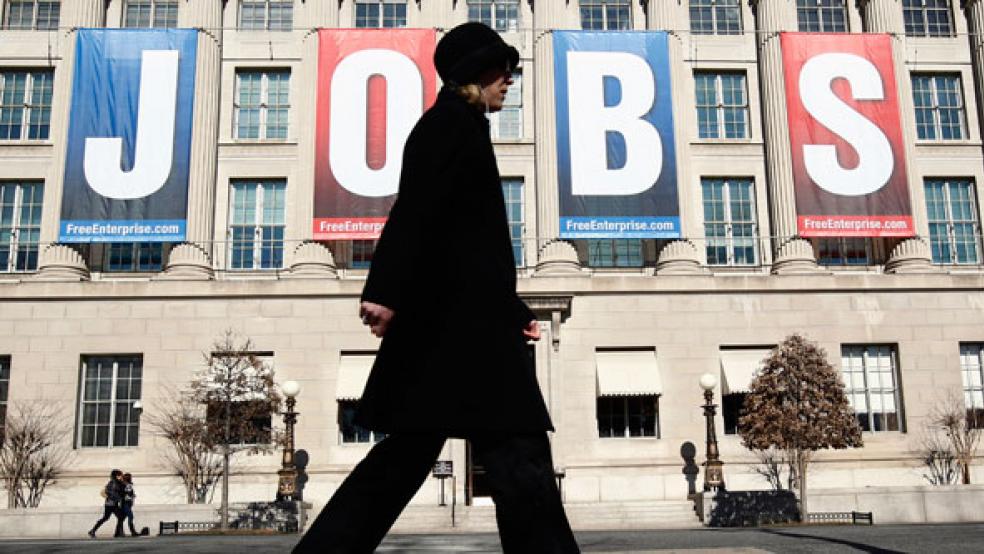Shortly after the first presidential debate on Wednesday night, all eyes will turn to one of the few factors that could still reshape the race: Friday’s jobs report, a barometer that will sort out the campaign rhetoric from the economic realities.

For Republican nominee Mitt Romney, it’s quite possibly the final opportunity to hype new evidence of President Obama’s shortcomings. But this time his message totally hinges on a total job market meltdown--layoffs instead of yet another lackluster showing that lets the Obama administration assure the country of slow but steady progress.
“People intuitively understand that the jobs situation isn't great, but it's simpler to understand when the jobs number is negative,” said Matt McDonald, an outside adviser to the Romney campaign and partner at Hamilton Place Strategies. “What they hear is the president touting 4.6 million jobs … They don't hear that during the same period, the population increased by 6 million. In that context, and in the context of workers dropping out of the labor force, the numbers seem pretty bad.
“If the jobs number Friday is negative, I think that will be a very bad moment for the president,” McDonald said. “Absent that, I think the number will confirm what voters already have a sense of: the job market just isn't that good.”
As strange as it sounds, Obama has been blessed by the combination of low economic expectations and modest but consistent improvement in an unemployment rate that peaked at 10 percent in October, 2009. Since the start of the year, payrolls increased by an average of 139,250 workers a month.
That leaves Romney with a slightly more convoluted and abstract case to make to voters. Unemployment has fallen in part because, over the past 12 months, more than 2.7 million Americans are no longer considered part of the labor pool, as the participation rate has fallen from 64.1 percent to 63.5 percent—a low last seen in 1981.
For the upcoming report by the Bureau of Labor Statistics, Wall Street economists projected for Bloomberg News that 114,000 jobs were added in September and the unemployment rate will sidle upward a tenth of a percentage point to 8.2 percent. The forces influencing the number include businesses becoming more reluctant to hire as the fiscal cliff approaches and seasonal events like the start of the school year.
If the numbers match the consensus estimates, the White House script could practically be photocopied from the previous month when payrolls inched up by a paltry 96,000.
After the August report, Alan Krueger, chairman of Obama’s Council of Economic Advisers, blogged: “While there is more work that remains to be done, today’s employment report provides further evidence that the U.S. economy is continuing to recover from the worst downturn since the Great Depression … The economy has now added private sector jobs for 30 straight months, for a total of 4.6 million jobs during that period.”

The White House commentary contains a politically attuned message. By repeatedly linking the 2007-2009 recession to the Depression—a fair comparison by many standards--when wiped-out Americans were reduced to living in tent cities and eating a soup of watered-down ketchup for dinner, the relatively high unemployment does not seem that terrible.
“If we keep waffling sideways as we have for months, the White House knows how to run its playbook,” said Douglas Holtz-Eakin, a former director of the Congressional Budget Office and economic adviser for Arizona Sen. John McCain’s 2008 presidential campaign.
American Crossroads, the Super PAC founded by Karl Rove, plans to combat that message with an $11 million ad buy for a television commercial running in several swing states. The camera zooms in on a man in a suit and no tie standing in an empty warehouse.
“This is what President Obama said the jobless rate would be if we passed his stimulus—5.6 percent,” he says directly to the camera as computerized graphics fly in front of him. If Obama had delivered as promised with the $787 billion stimulus, the country would have 3.7 million more jobs and, presumably, the deficit would be lower, he explains.
No president has been re-elected since 1948 with unemployment above 7.2 percent, but if Obama’s margin in the polls delivers, that rule is far from hard and fast. As almost three years of meager jobs gains have numbed expectations, the presidential race has become as much about personalities as economic issues.
“You can talk about issues until the cows come home, but people vote for people and not for issues,” Democratic strategist Brad Bannon told The Fiscal Times. “That’s Romney’s problem.”



